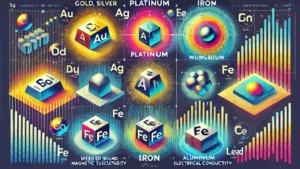Nine reasons why I think it is wise to choose physical gold as an investment to protect your capital.
Disclaimer:
The information provided does not constitute a solicitation for the placement of personal savings. The use of the data and information contained as support for personal investment operations is at the complete risk of the reader.
Contents
#1. Gold is money 💰
Gold has been considered universal money for millennia, as it maintains its value independently of currencies or governments. It cannot be printed or artificially created, ensuring a stable and inflation-resistant store of value. In times of economic crisis or currency devaluations, gold acts as a safe haven, preserving purchasing power. Its global acceptance makes it a means of exchange recognized everywhere, beyond national borders. Investing in gold therefore means owning a form of real, tangible money free from risks associated with the financial system.
#2. Gold can be touched 👐
Gold is a tangible asset that can be touched, seen and physically stored, offering concrete security compared to digital or financial assets. Its materiality eliminates the risk of bank failures or computer blocks, making it an always accessible asset. Owning physical gold means having a real value in your hands, independent of intermediaries or virtual markets. Its durability makes it immune to deterioration over time, guaranteeing stability and value for future generations. In an increasingly virtual world, gold represents an anchor to economic reality.
#3. Gold has no counterparty risk 💱
Physical gold does not carry counterparty risk because its value does not depend on the reliability of financial institutions or governments. Unlike stocks, bonds or bank deposits, gold does not require an issuer or guarantor: its intrinsic value remains intact regardless of corporate failures or systemic crises. Owning gold means eliminating the risk that third parties will not honor their financial commitments. Furthermore, it is not subject to default, insolvency or institutional blockades, thus offering total capital protection. In times of economic uncertainty, gold represents a concrete and autonomous certainty.
#4. Gold also means anonymity 🕵
Physical gold offers a high level of anonymity , as its ownership is not tracked by financial institutions or public records. Unlike bank accounts or digital investments, it does not require third-party intermediation or leave traces in electronic systems. This makes it ideal for those seeking financial confidentiality and protection of their privacy. The purchase and storage of physical gold can be done discreetly, away from external controls or direct tax exposure. Furthermore, in situations of political or economic instability, gold offers the freedom to dispose of one’s assets without official constraints or restrictions.
#5. Gold is liquid and portable 💼
Gold is a highly liquid and easily transportable asset , making it ideal for those seeking flexibility and immediate access to their wealth. It can be sold quickly anywhere in the world due to its universal acceptance and constant demand in the markets. Even in small quantities, gold concentrates a high value, making it easy to transport safely and discreetly. This characteristic makes it a useful tool in emergency situations or for those who want to keep part of their wealth outside of traditional financial channels. In addition, gold maintains its value even during international transfers, without the need for currency conversion.
#6. Gold is easy to store 🏦
Gold is an unalterable metal that does not corrode, rust or lose value over time, making it extremely easy to store. Its natural resistance to atmospheric and chemical agents guarantees eternal durability without the need for special maintenance. Even in the form of coins or bars, it maintains its physical characteristics and intrinsic value intact. Furthermore, thanks to its high value density, it requires little space to be safely stored, whether in a private safe or in a secure vault. This makes it ideal for accumulating and passing on wealth in the long term, without additional storage costs.
#7. Gold doesn’t require skills 🧮
Gold is a simple investment that does not require advanced financial skills to understand or manage. Unlike stocks, bonds or cryptocurrencies, it is not influenced by complex strategies, corporate balance sheets or market technicalities. Its value is universally recognized and determined mainly by global demand, making it easily assessable even by non-experts. Buying and storing physical gold is a straightforward process, free from complex speculative dynamics. Furthermore, it does not require constant monitoring or in-depth analysis, offering a clear and accessible investment solution for all.
#8. Gold will always have some value 💲
Gold has maintained its intrinsic value for thousands of years, going through wars, economic crises and political changes without ever losing its relevance. Unlike fiat currencies or digital assets, it cannot completely devalue or become worthless. Its natural scarcity and constant demand in the financial, industrial and gold sectors ensure that gold will always have a market . Even in scenarios of economic collapse or global instability, gold remains a recognized and accepted asset as a medium of exchange or store of value. It is, therefore, a form of wealth that survives time and crises, offering security without expiration.
#9. Gold protects against collapses 📈
Gold has historically been recognized as a safe haven during financial crashes, protecting investors’ assets when traditional markets falter. In times of economic crisis, high inflation or political instability, gold tends to maintain or even increase its value, providing a hedge against losses from more volatile assets such as stocks or bonds. Its independence from banking dynamics and market cycles makes it an effective tool for diversifying portfolios and reducing systemic risks. Furthermore, its demand grows in times of uncertainty, strengthening its role as a wealth protector in times of global crisis.




Leave a Reply